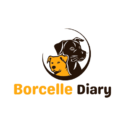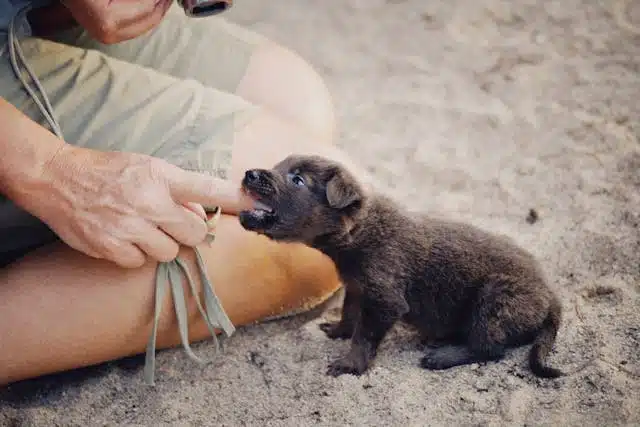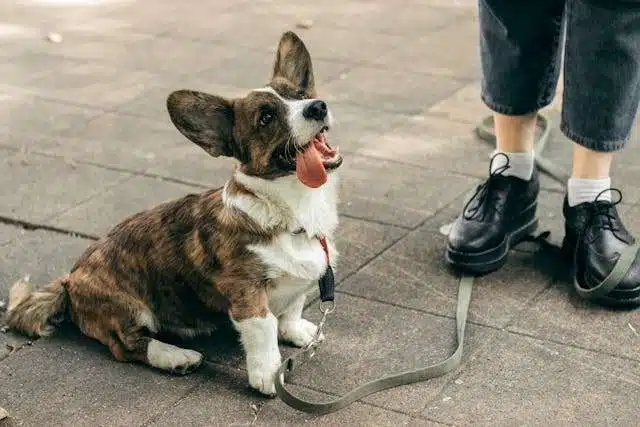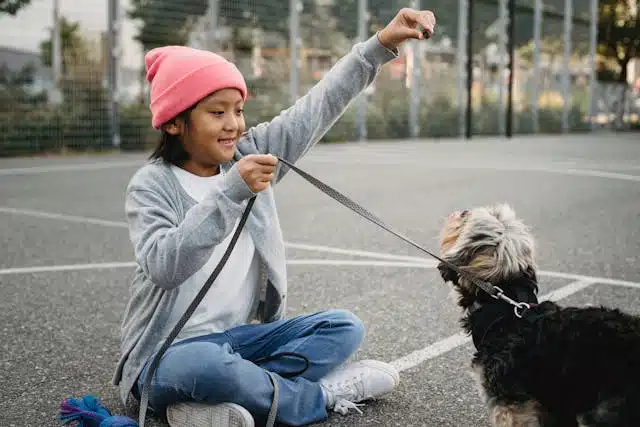Stop Puppy from Biting by knowing that your puppy sees everything as a chew toy in their first six months. But those sharp little puppy teeth can put holes in not just your shoes but also things like your fingers and your ankles too. So, what can you do about it? A lot, actually. Our article will cover why puppies bite, how you can redirect that behavior, and what you should avoid when training them.
Table of Contents
ToggleWhy Do Puppies Bite?
Puppy biting isn’t bad behavior. It’s actually completely normal behavior that just requires a little bit of shaping. Your puppy needs to learn what’s appropriate to put their teeth on and what’s not. Other reasons your puppy might bite are frustration, self-soothing, or just playing around with you or other dogs, or protecting their food or toys.
6 Puppy Training Don’ts

Your puppy’s biting isn’t meant to cause harm. They’re just exploring and discovering how to relate to people, other animals, and new objects in their environment. You can stop puppy from biting in several ways. So the next time your puppy gets a little bit mouthy, keep some of these next moves in mind.
1. Stop The Fun
The first thing that you can do to stop puppy from biting is immediately stop the fun when teeth hit the skin. Grab something that they can have, like a squeaky toy, and give that to them to redirect those teeth.
2. Stash toys throughout the house
If your puppy starts biting you, you need to be able to immediately disengage and grab one of those stash toys to redirect them. Once they begin biting the toy, positively reinforce them for chewing on the toy instead of your hands.
3. Try Some Brain Games At PlayTime
Try adding in some brain games with playtime in order to stop puppy from biting. For example, you might be playing tug of war with your puppy, but then you can practice your “drop it” cue as well to get them thinking. The process might go tug, tug, tug, drop it, tug, tug, tug, drop it, and so on. This can really help slow the thinking down and help with impulse control as well.
4. Use Nutritious Kibble As Your Training Treats
In this case, if your puppy’s primary source of food is kibble, you can put some of it in your treat pouch and use it as a reward for good behavior. But also, if you feed kibble, you may wanna soften it a little bit at mealtime with water or use something like bone broth, which is really yummy, just so it’s not always something hard on their gums during that teething period.
5. Move Fast To Quell Puppy Biting In Motion
As long as your puppy loves to bite fast-moving objects while you’re walking or running or trying to redirect him, you might want to use that to your advantage. So immediately disengage as you’re walking by and your puppy goes to grab your ankles and then shake something fast so that you can replicate that catch and grab that satiates their desire to wanna catch and grab and chase, so that this is where we can have an outlet for that behavior versus an outlet to your walking ankles or running legs.
6. Make Sure They Get Their Puppy Naps In
Young puppies sleep about 18 hours on average a day. So not getting that adequate sleep time can lead to frustration biting, but also it can lead to less learning for the puppies. Sleep is really, really important to learning. Provide a quiet dark room for your puppy’s naps and give them at least two crate naps per day, plus overnight.
If you find that your puppy has difficulty winding down and settling, try giving them a Calm Chew to help them relax into nap time. You can also cut up Calm Chews and use them as training rewards during training sessions before you place your puppy in their crate for their puppy nap. Just be sure that you check the appropriate dosages for how much you can give your puppy in one day.
How To Stop Inappropriate Puppy Biting
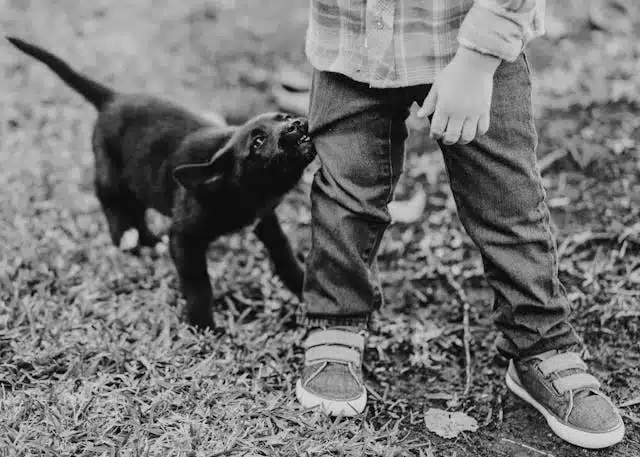
While there are a lot of things that you can do to reinforce good behaviors in your puppy, there are some scenarios that you’re gonna wanna steer clear of to help you maintain everything that you’re teaching during training.
Avoid Rough Play During PlayTime
Puppies have a difficult time controlling themselves when they’re in a high arousal state, and rough play directly contributes to that high arousal state. So keep your playtime a little more on the mellow side.
Don’t Look To “Time Out” In The Crate To Send A Message
Don’t look to giving your puppy a timeout in the crate to send a message. Crate timeouts can actually cause your puppy to develop a negative emotional state with the crate, and you always want the crate to be a safe and happy place for your puppy.
Avoid Loud Yelping for Benign Biting
Never let out a loud yelp in response to your puppy’s benign biting. If you repeat that fun noise, some puppies will see it as play and bite you even harder.
Don’t Punish Your Puppy
Don’t punish your puppy for biting. Yelling at them, hitting them, even just popping them on the nose can actually promote biting as a defense mechanism.
Don't Tolerate Play-Biting
Don’t tolerate play biting, even gentle nibbling. The more that your puppy gets familiar with using their teeth on human skin, the more likely they are to continue using their teeth on human skin after the puppy biting phase ends.
Don’t delay professional help if your puppy is exhibiting aggressive behavior. If they’re growling, snarling, or snapping, and they seem pretty serious about it, or if they’re biting to the point that it’s breaking the skin and it really hurts, it’s time to involve a veterinary behaviorist or a certified dog behavior consultant. They can help you as soon as possible, especially while they’re still little and still learning.
When Do Puppies Stop Biting
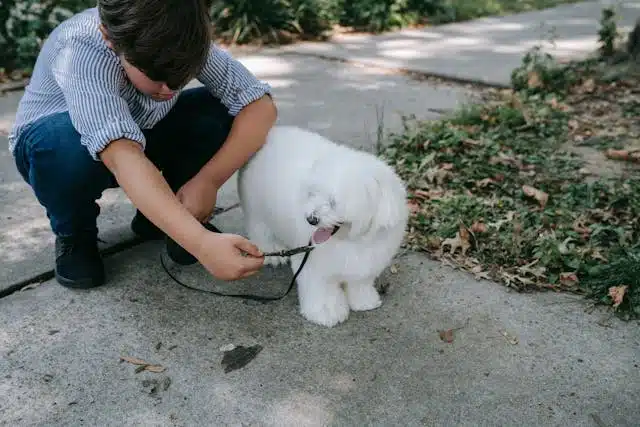
If you’ve trained your puppy, then puppy biting should go away after all of those adult teeth are in, right around that six-month mark. So if your puppy is still biting because they like to for fun or for comfort, you can provide strong rubber toys for them to gnaw on or something like long-lasting chews, such as Yak Chews.
Now, whether you look to a professional trainer for help or you try some of the things that we explored in this article to help you with puppy biting, be consistent with your training, start your training early, and you’ll be happy to note that you’ll have fewer gaps in those favorite pairs of shoes, as well as your fingers from those sharp little puppy teeth.
